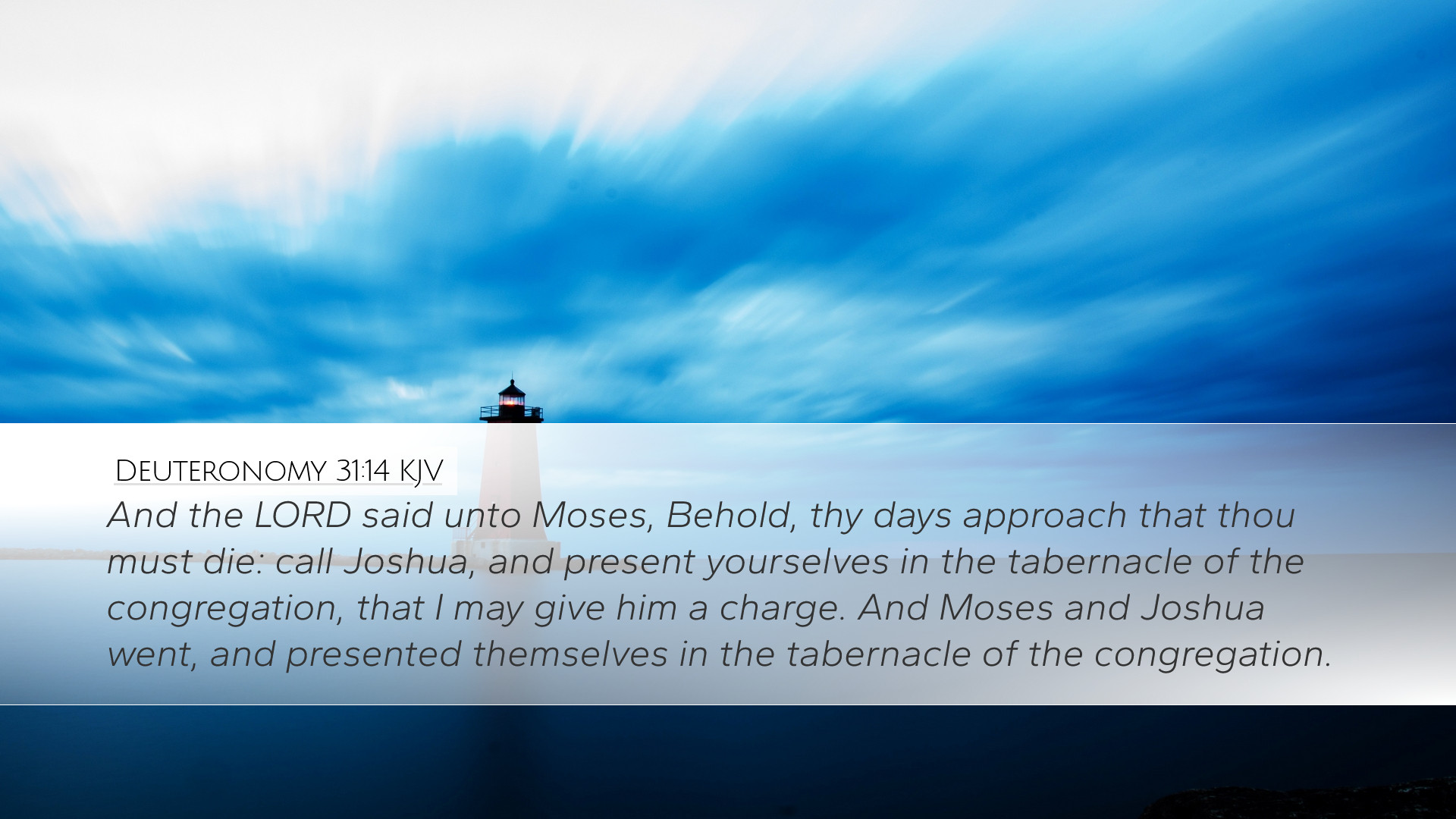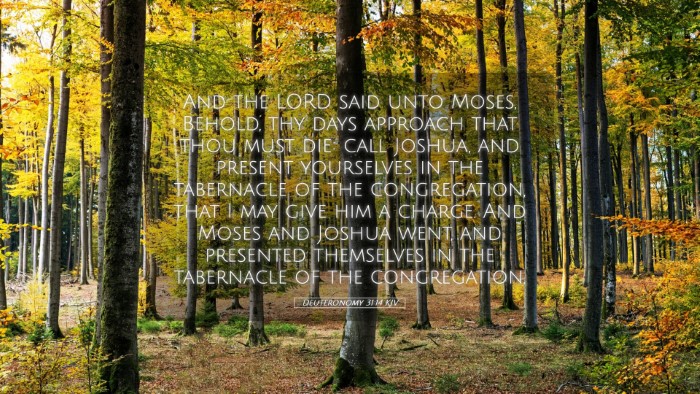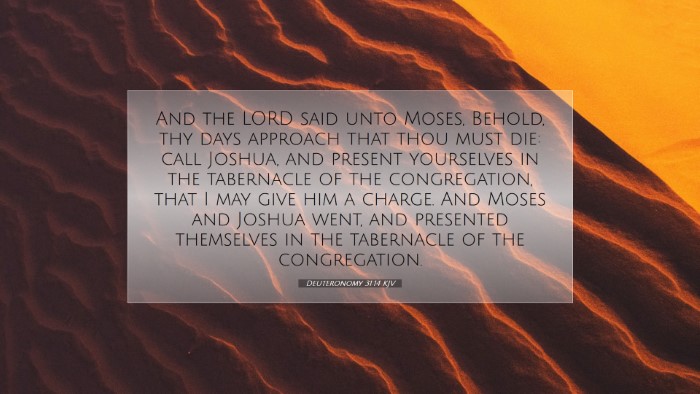Commentary on Deuteronomy 31:14
Bible Verse: Deuteronomy 31:14 (KJV): "And the LORD said unto Moses, Behold, thy days approach that thou must die: call Joshua, and present yourselves in the tabernacle of the congregation, that I may give him a charge. And Moses and Joshua went, and presented themselves in the tabernacle of the congregation."
Introduction
This passage falls within a critical juncture of Israel's history, marking the transition of leadership from Moses to Joshua as they prepare to enter the Promised Land. The insights from leading public domain commentaries illuminate this verse's theological, historical, and pastoral significance.
Context and Background
Moses, having led the Israelites out of Egypt and through the wilderness for 40 years, now prepares to pass on the mantle of leadership. God’s decree of Moses’ impending death signifies a pivotal moment not only in Moses' life but also for the nation of Israel. The call for Joshua to present in the tabernacle emphasizes the communal and spiritual dimensions of this transition.
Insights from Matthew Henry
Matthew Henry highlights the importance of divine communication in leadership transitions. He notes that:
- God's Sovereignty: The acknowledgment of God's control over life and death underscores His sovereignty. Moses' death was divinely appointed, serving as a reminder of God's ultimate authority.
- Preparation of Leaders: God instructs Moses to call Joshua, displaying a model of preparation in leadership. He emphasizes the need for a successor who is spiritually equipped to lead the people into the Promised Land.
- Gathering in Unity: The command for Moses and Joshua to present themselves in the tabernacle signifies unity and the recognition that leadership is grounded in communal worship and divine purpose.
Insights from Albert Barnes
Albert Barnes offers a deeper examination of the text, elucidating key themes such as:
- Communication of God's Will: Barnes emphasizes the significance of God's verbal communication with Moses, reflecting the profound relationship between God and His chosen leaders.
- Transition of Responsibility: The act of Moses calling Joshua points to the necessity of preparing the next generation of leaders. This reflects the eternal principle of succession in spiritual leadership necessitated by God’s providential plan.
- Symbolism of the Tabernacle: The tabernacle represents God's presence among His people. Barnes notes that significant decisions and transitions are best conducted in the sacred space of divine worship, highlighting the interconnectedness of spirituality and leadership.
Insights from Adam Clarke
Adam Clarke provides a detailed exegesis, focusing on the cultural and historical implications of the passage:
- Historical Significance: Clarke situates this event within the broader narrative of Israel’s journey, noting the historical anxiety surrounding the transition of leadership as Moses symbolizes the lawgiver.
- Spiritual Leadership: He discusses the qualities of Joshua, reflecting on his earlier service as Moses’ aide, thus illustrating the importance of experiential readiness for those in leadership roles.
- Divine Charge: The “charge” that God plans to give Joshua constitutes key instructions and encouragement, affirming the continuation of God’s mission for Israel, emphasizing reliance on God’s guidance.
Theological Implications
This verse embodies essential theological themes, crucial for pastors and theologians:
- God's Faithfulness: The transition represents God’s faithfulness throughout the generations, affirming His promise to lead and guide His people.
- Leadership and Community: The communal aspect of Joshua's appointment in the tabernacle suggests that within leadership roles, the responsibility carried is not merely personal but profoundly communal, infused with collective purpose and accountability.
- Continuity of God's Plan: The seamless transition of leadership illustrates God’s overarching plan for His people, ensuring that His purposes are realized through authorized leadership.
Practical Applications
For pastors, students, and theologians, the lessons drawn from this passage can be directly applied to modern contexts:
- Preparation for Leadership: There is a crucial need to invest in future leaders, providing them with mentorship and opportunities to develop their spiritual gifts.
- Encouragement for Transition:** In moments of transition, it is vital to seek God’s guidance and maintain a strong sense of community to navigate changes effectively.
- Emphasizing Sacred Spaces: Recognizing the importance of sacred spaces for worship and decision-making can enhance the awareness of God’s presence during significant transitions.
Conclusion
Deuteronomy 31:14 provides a profound insight into the dynamics of leadership, community, and divine providence. The reflections from Matthew Henry, Albert Barnes, and Adam Clarke emphasize the significance of God's prepared leaders, the importance of divine charge, and the necessity for divine guidance throughout transitions in spiritual leadership. It serves as an essential reminder for current leaders to honor God’s directives while nurturing the next generation of leaders within the community of faith.


